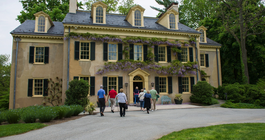
January 26, 2015
 File Art /for PhillyVoice
File Art /for PhillyVoice
Positive thinking tells us to assume that something wonderful might happen instead of worrying about the worst case scenario.
Philadelphians are a notoriously disgruntled lot, right?
Actually, the City of, well, Brotherly Love (and Sisterly Affection) is an optimistic hot-bed of positive thinking research.
That’s thanks to the happy presence of Dr. Martin Seligman, a Penn professor and the director of its Positive Psychology Center (PPC), and his merry band of cohorts.
The author of titles like "Authentic Happiness" and "Learned Optimism," Seligman called for a re-examination of his field in 1998 while serving as the head of the American Psychological Association.
Promoting what he termed “positive psychology,” he asked practitioners to shift their emphasis from trying to “fix” patients to instead helping them lead fuller lives. The field is founded on the belief that people want to cultivate what is best within themselves and to enhance their experiences of love, work and play, according to the Positive Psychology Center's website.
“It was a new idea that attracted a variety of young scholars with related interests,” says Dr. Barry Schwartz, a professor of social theory and social action at Swarthmore College. Schwartz also teaches at the PPC.
Louis Alloro: “The crux of what I do is to reframe our conditioning so we assume that something wonderful might happen instead of worrying about the worst-case scenario.”
But wait a minute. Hasn’t the idea been around at least since the 1950s, when Dr. Norman Vincent Peale released "The Power of Positive Thinking"? And hasn’t there been a steady continuum of such tracts, right on through Gretchen Rubin’s "Happiness Project" books?
It’s the science behind happiness that’s the distinguishing factor, says Schwartz.
Seligman wanted something based on “hard laboratory research and verifiable principals,” he observes, pointing out that he and other confidantes helped Seligman establish credentials for that emerging discipline. “He basically created a field, a new psychological discipline, in the space of a decade.”
And ever since, a tight network of peers and former students has stayed in the region. They’re intent on spreading the good word about looking on the bright side of life.
Take Louis Alloro, for example. He received his master's of applied positive psychology from Penn in 2008 and has been trying to figure out what to do with it.
Now, after teaching the philosophy’s basic tenets — mindfulness, optimism, positive reinforcement — everywhere from Cleveland to Istanbul, he’s returned to Philadelphia to offer, with fellow Seligman disciple Emiliya Zhivotovskaya, a six-month certificate program that will study the “science of well-being and flourishing.”
It’s aimed, he says, at change agents like educators and life coaches but has applications for everyone.
“The crux of what I do,” he says, “is to reframe our conditioning so we assume that something wonderful might happen instead of worrying about the worst-case scenario.”
Think about when your friend recounts a particularly trying day.
“You keep pressing for more and more details,” Alloro says. "But if she has something exciting and fun to relay, you just sort of say, ‘That’s great!’” Instead, try ‘active constructive responding.’ “When she’s telling you about this awesome restaurant, help her capitalize on the good stuff,” he suggests. “Ask her which menu item she liked the best, what the restaurant looked like, what she wished she had tried.”
“If you’re a giver at work, you simply strive to be generous in sharing your time, energy, knowledge, skills, ideas, and connections with other people who can benefit from them,”
Tools like this can help develop a more civil, kind and generous world, positive psychologists posit.
Organizational psychologist Adam Grant, a professor of management at Penn, is a key proponent of this thinking. As he outlined in his 2013 best-seller "Give and Take," research shows that successful people demonstrate a willingness to say yes.
“If you’re a giver at work, you simply strive to be generous in sharing your time, energy, knowledge, skills, ideas, and connections with other people who can benefit from them,” he writes in his introduction.
“Across occupations,” he continues, “givers are more likely to become champs — not only chumps.”
Workplace satisfaction is a focus of Swarthmore’s Schwartz, too.
“Economists formulate theories based on a set of assumptions about human psychology that are almost all incorrect,” he says. “If you create a work environment based on the idea that people are only interested in money and in themselves, then you deprive them of the opportunity to get real satisfaction out of what they do for half their life.”
His newest book, "Why We Work," makes a plea that we rethink that.
“Meaning and engagement are two significant components of what Seligman calls ‘authentic happiness,’” he points out.
Still, last year, researchers at the University of British Columbia and Harvard University, using data from the Centers for Disease Control and Prevention, included Philadelphians — along with denizens from other post-industrial cities like Pittsburgh, Buffalo, St. Louis, Detroit and Milwaukee — among the 10 unhappiest urban populations.
Why aren’t we a happier lot?
“Well, we may be an epicenter for positive psychology,” says Schwartz, “but we’re still a big city. Beyond that, I don’t think the superficial grumpiness of Philadelphians is a reflection of anything deeper.”
For Alloro, though, there could be a, er, more positive connection between the city and the field.
“Philadelphia has its roots in freedom,” he says. “And positive psychology gives us the freedom to unlock the negative thinking that has been wired into us.”